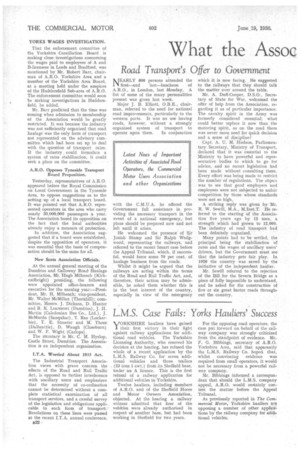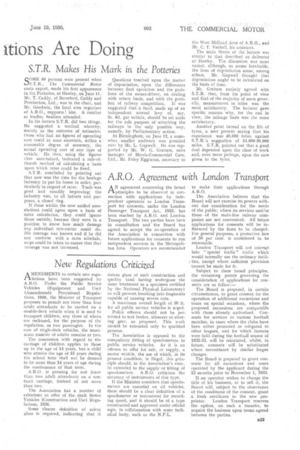What the Assoc itions Are Doing
Page 32

Page 33

If you've noticed an error in this article please click here to report it so we can fix it.
Road Transport's Offer to Government
S.T.R. Makes His Mark in the Potteries NEARLY 800 persons attended the first—and last---luncheon of A.R.O., in London, last Monday. A list of some of the many personalities present was given last week.
Major J. B. Elliott, 0.B.E., chairman, referred to the need for national road improvements, particularly to the western ports. It was no use having roads, however, without a strongly organized system of transport to operate upon them. In conjunction with the C.M.U.A. he offered the Government full assistance in providing the necessary transport in the event of a national emergency, but plans should be prepared now and not left until it arises.
He welcomed the presence of Sir Josiah Stamp and Sir Ralph Wedgwood, representing the railways, and referred to the recent Smart case before the Appeal Tribunal, which, if successful, would force some 74 per cent, of haulage business from the roads.
Whilst it might be argued that the railways are acting within the terms of the Road and Rail Traffic Act, and, therefore, their action may be admissible, lie asked them whether this is in the best interest of the country, especially in view of the emergency which it is now facing. He suggested to the railways that they should talk the matter over around the table,
Mr. A. Driff-Cooper, D.S.O., Secretary of State for War, welcomed the offer of help from the Association, regarding it as of particular importance. The cavalry spirit in the Army was formerly considered essential; what could better replace it now than the motoring spirit, as on the road there was never more need for quick decision and a sense of discipline?
Capt. A. U. M. Hudson, Parliamentary Secretary, Ministry of Transport, declared that it was essential to the Ministry to have powerful and representative bodies to which to go for advice, and no recent legislation had been made without consulting them, Every effort was being made to restrict the number of regulations. The object was to see that good employers and employees were not subjected to unfair competition by those whose standards were not so high.
A striking reply was given by Mr. R. W. Sewill, M.A., M.Inst.T. He referred to the starting of the Association five years ago by 12 men, a strength which had grown to 12,004. The industry of road transport had been definitely organized.
Many points had to be settled, the principal being the stabilization of rates and the wages of ancillary users' drivers, but the Government must see that the industry gets fair play. In 1926 the country was saved by the initiative of the independent haulier.
Mr. Sewill referred to the rejection of the Bill for the Severn. Bridge as a piece of folly impossible to understand, and he asked for the construction of five or six great Motor roads throughout the country. SOME 50 persons were present when S.T.R., The Commercial Motor costs expert, made his first appearance in the Potteries, at Hanley, on June 11. Mr. T. Caddy, of Beresford, Caddy and Pemberton, Ltd., was in the chair, and Mr. Goodwin, the local area organizer of A.R.O., supportel. him. A number 01 leadino hauliers attended.
In his lecture S.T.R. did two things. He suggested a method whereby, mainly as the outcome of estimates, those who had no figures of operating cost could. at once ascertain, within a • reasonable degree of accuracy, the actual operating cost of any type of vehicle. He then, using the figures thus ascertained, indicated a rule-ofthumb method of calculating a basis upon which rates could be fixed.
S.T.R. concluded by pointing out that now was the time for the haulage industry to put its house in order, particularly in respect of rates. Trade was good and steadily improving; the industry was, to all intents and purposes, a closed ring.
If those within the now unified associations could agree upon a basis of rates calculation, they could ignore those outside, because they were in a position to know bow much damage any individual rate-cutter could do. His tonnage was known and if he did not conform with a rates schedule, steps could be taken to ensure that that tonnage was not increased. Questions touched upon the matter of depreciation, upon the differences between fleet operation and the problems of the owner-driver, on dealing with return loads, and with the problem of railway competition. It was suggested that a fund, made up of an independent annual levy of, say, Zs. 6d. per vehicle, should be set aside for the sole purpose of attacking the railways in the only possible way, namely, by Parliamentary action.
At Birmingham, on Jane 12, a somewhat smaller audience was presided over by Mr. L. Gupwell. He was supported by Mr. W. G. Graham, sales manager of Morris-Commercial Cars, Ltd., Mr. Foley Egginton, secretary to the West Midland Area of A.R.O., and Mr. C. T. Vachell, his assistant.
The main theme of the lecture was similar to that described as delivered at Hanley. The discussion was more varied, although, as seems inevitable, the item of depreciation arose, among others. Mr. Gupwell thought that depreciation ought to be calculated on the basis of time.
Mr. Graham entirely agreed with S.T.R. that, from his point of view and that of the majority of users generally, measurement in miles was the most satisfactory. The lecturer gave specific reasons why, for the end in view, the mileage basis was the more satisfactory.
Another point turned on the life of tyres, a user present saying that his experience was 40,000 miles, against S.T.R. 's suggestion of 24,000-30,000 miles. S.T.R. pointed out that a good deal depended upon the class of work and, even more perhaps, upon the care given to the tyres.




















































































